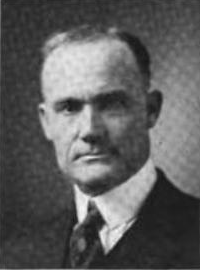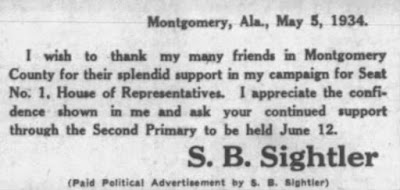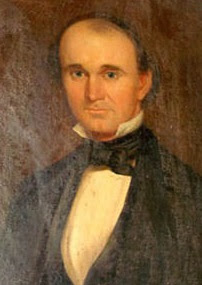From the Mississippi Official and Statistical Register, 1924-28.
Certainly one of the more unusual names to be found among past Mississippi state representatives, Electious Williams Davis represented Jefferson and Claiborne County for one term beginning in 1923. A lifelong Mississippian, Davis was the son of John Whitfield and Julia (Havis) Davis, his birth occurring in Caseyville on March 25, 1874. A student in the common schools, Electious Davis's education was "acquired through his own efforts" and he would attend the Chamberlain-Hunt Academy and the summer normal schools in Brookhaven and Clinton, Mississippi.
For five years Davis followed a teaching career before turning his efforts towards law studies. He read law at home via bought and borrowed books and later studied under future state chancellor Richard Wiltz Cutrer in Port Gibson. Davis married in Mississippi in January 1899 to Rhoda Belle Middleton (1879-1953), to who he was wed for nearly fifty years. The couple had three children, Annie Belle (1899-1938), Percy Williams (birthdate unknown), and Prentiss Elliott (1907-1975).
Active in the First Baptist Church in Port Gibson, Davis was a longstanding member of the Modern Woodmen of the World, a farmer, and served as Secretary and Treasurer of the Claiborne County National Farm Loan Association. He also was named an abstractor by the Federal Land Bank of New Orleans as a land title examiner.
From the Port Gibson Reveille, March 6, 1919.
Electious Davis entered local politics with his service as a constable and justice of the peace, and in 1915 was an unsuccessful candidate for county superintendent of public instruction. In March 1919 he announced his candidacy for Claiborne County attorney, with the Port Gibson Reveille noting that:
"There has never been the slightest reproach against his character. He has always borne the reputation of doing well anything he has ever undertaken, and if elected to this office he will give his best effort."
Running against Davis that year was another oddly named man, Milling Marion "M.M." Satterfield, then serving as county attorney. When the votes were tallied that August it was Satterfield who won out, polling 5,462 votes to Davis's 1,283. Undeterred by his loss, Davis later set his sights on a seat in the Mississippi house of representatives and in 1923 was elected to that body. Serving from 1924-28, he sat on the committees on the Constitution, Fees and Salaries, and Liquor Traffic.
Little else is known of Electious Davis's life following his term in the legislature. In 1930 he is recorded as a census enumerator for Claiborne County, and his death occurred in Mississippi on January 28, 1947, aged 72. He was survived by his wife and children and was interred at the Wintergreen Cemetery in Port Gibson.










